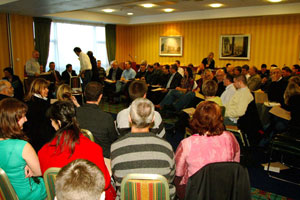4 January 2007 Edition
Ard Chomhairle meeting: Eight years of negotiations leads to historic juncture
BY JIM GIBNEY

The meeting of Sinn Féin’s Ard Chomairle
A date with history in airport hotel
As thousands of Irish people descended on Dublin airport to fly off on a date with the sun on the eve of the new year, a group of republicans met in the nearby Great Southern Hotel for a date with history. Not for the first time in the past decade of the peace process republicans would leave their mark on history before the day was out.
The meeting of Sinn Féin’s Ard Chomairle, was special for a number of reasons. It was the first ever Ard Chomairle meeting called with the purpose of discussing a proposal on policing from Sinn Féin President Gerry Adams.
It was only the second time since the IRA called its first cessation in August 1994 that the leadership of Sinn Féin was being asked to take a monumental decision. The first being the decision to enter into a Six County administration following the Good Friday Agreement negotiations in 1998 .
But for me this gathering was dealing with an issue far bigger and perhaps more significant than the decision to change Sinn Féin’s constitution to allow the party to take part in a Northern Assembly. The decision on policing was on a par with the IRA’s decision to put their weapons beyond use, to end their armed campaign.
Those who turned out for the meeting, given the time of year, reflected the enormity of the decision under consideration. The party’s national leadership were there. As were the party’s key negotiators who had been locked into negotiations for months with the British Government. These were the 'detail merchants’ who trawled, tracked and checked documents relating to the eight years of negotiations on policing which led to this juncture. Their Christmas was lost in browsing over documents, endless telephone conversations with the British Government and Tony Blair.
On Christmas Eve the gates at Stormont were closed. But the Sinn Féin leadership were working away. There was no let up for them on Christmas Day or St Stephen’s Day. There was no let up as the New Year dawned.
Sinn Féin’s negotiating team answered many questions of concern from the Ard Chomairle during the five-hour meeting last Friday. They were in the company of Sinn Féin’s five TDs; the party’s five MPs, its two MEPs; its General Secretary; the party’s leader of the Six County Assembly and several MLAs; the leader of Ógra with a strong team of young republicans; this paper’s editor; chairpersons of Cúigí across the country; heads of departments – US, Equality, International, Europe and individual members of the Ard Chomairle. Two former General Secretaries, Tom Hartley and Lucilita Breathnach were invited as guests to the unprecedented meeting.
These were the representatives of a liberation movement now in transition, from resistance on the streets, to a liberation movement inside the political institutions of power, shaping a new Ireland, itself in transition as a result of the peace process.
That morning the taxi driver who took me to the bus station told me that we were ‘facing a tough decision and would need strong will’.
Many of the 80 or so people at the meeting were used to making tough decisions from their young years. Their strong will saw them through hazardous times.
Hazardous times which placed them at the centre of an armed conflict. They faced what was for some the most difficult decision in a lifetime of struggle.
They were aware of the record of repression visited upon them and their communities by the crown forces, the RUC in particular and the Garda Special Branch.
Across this island hundreds of people were grieving for IRA volunteers who lost their lives at the hands of the crown forces. Hundreds more lost through collusion with loyalists. People were tortured in interrogation centres by the RUC, many ended up in jail for years on false confessions beaten out of them in these centres.
An emotional point in the peace process had been reached with a legacy of a 30-year war and the years of Partition before that when unionist militias like the RUC and the B-Specials held the Six Counties for the British crown.
But members of the Ard Chomairle also knew that republicans were not the only people living on this island hurt during to the conflict. The unionist people were also hurting. The peace process was about bringing all of that, including the causes of conflict, to an end. A lot of progress had been made towards that objective in the last decade.
The people in that room had played a big part in that process. And willingly did again last Friday when they backed Gerry Adams’ proposal to hold a special Ard Fheis on policing. It is now over to the British and Irish governments and the DUP to play their part.


